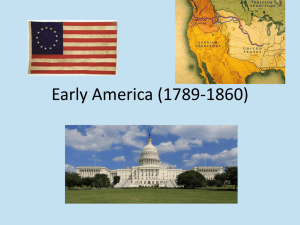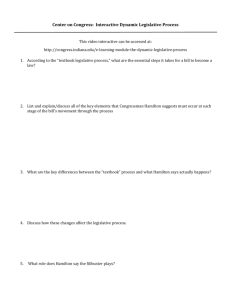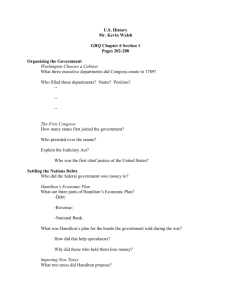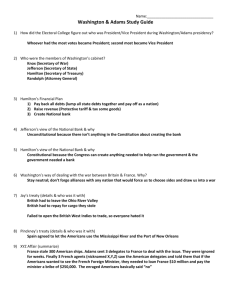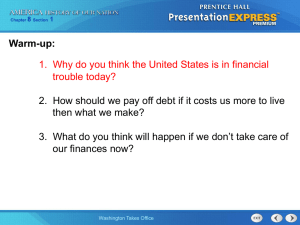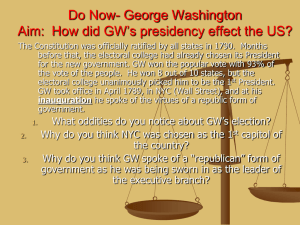Launching the New Ship of State: 1789-1800
advertisement
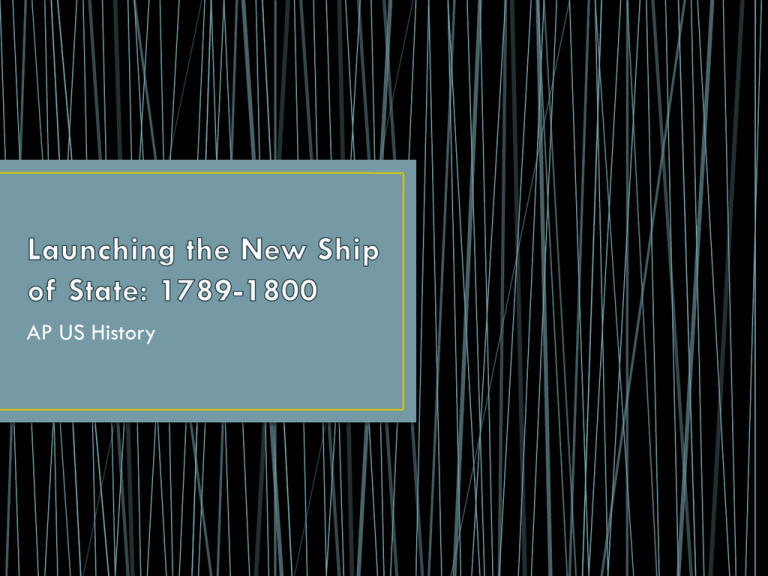
AP US History • America has just constructed a new form of government under the Constitution • President? • Judiciary? • Bill of Rights? • We have to be very cautious about our foreign relations we can not afford to go to war. We are still very weak and vulnerable. • George Washington is drafted President in 1789 • REASON: • • • • Trustworthy War Hero Aligned the North with South Not like other Politicians • He didn’t want to be President • He establishes Cabinet (Not in Constitution) • Washington will set the precedent for every President after himself • Importance: W/O promise Constitution wouldn’t have been ratified most likely • Purpose: Intended to protect individual liberties from a potentially tyrannically strong central government • Consists of the first 10 Amendments of the Constitution ------------------------------------------------------------------------------Judiciary Act of 1789: Organized the Supreme Court w/ chief justice and five associate justices • Set up Federal District Courts (13) • Alexander Hamilton is a key member of the young government: “Father of National Debt/Modern Banking” • GOAL: To correct economic problems that had cripple the Articles of Confederation • Report on Public Credit 1790 • PLAN: Shape gov financial policy to favor the wealthy, in turn they would lend the gov monetary/political support. Then the prosperity would flow down to the masses • 1st Objective: to bolster the national credit • Needed Congress to take on the entire national debt • Funding Par: Meant Federal gov would pay back its debt at face value, plus interest ($54 Million at the time + $13 Million interest) • Lack of Confidence from people, This will build TRUST in our nation • Congress passes act in 1790 • 2nd Objective: Hamilton wanted Congress to assume state debts (Assumption) of $21.5 Million. • Assumption: National debt would assume state debts • Argument: b/c debt was incurred fighting for national independence it should be taken on by national government • Thought: assumption would chain states more closely together (Support) • Problem: States with large debt (EX: Mass) wanted this but states w/ small debt (EX: Virginia) didn’t • Solution: Virginia would get federal district (now D.C) on the Potomac (Commerce/prestige) and Assumption would get passed through Congress. • 3rd Objective: Create revenue to pay off debts • How could the Federal government pay off debt? • ANSWER: Customs duties and excise tax (on few domestic items) • Interesting how they had just fought a war revolving around taxes but are now more then willing to implement tax to pay off debt much like Britain had tried to do. • Hamilton saw the national debt as “National Blessing” • The more people gov owes the more people want it to succeed. This will cause UNION ADHESIVNESS • Customs Duties (Tariffs) • Tariffs depend on vigorous foreign trade to make money (critical to Hamilton’s plan) • 1st Tariff Law (1789): passed by Congress (8% on value of dutiable imports) • GOAL: Revenue, protect industry in its infancy • Excise Tax (internal revenue 1791) • First was a tax on whiskey (7 cents/gallon): Paid by seller -Challenged in 1794 by Whiskey Rebellion (Gov shows it will not put up with armed mobs) • Problem: Whisky is a form of currency on the frontier • 4th Objective: Bank of the United States (Capstone) • Private institution in which gov is major stockholder and would deposit its surplus funds. • POSITIVES: 1. Strongbox for Federal Gov (Safe place for money) 2. Federal Funds would stimulate business by being in circulation 3. Sound an stable national currency Thomas Jefferson Alexander Hamilton • The Bank becomes national Unity issue • Support for the bank is rooted in the North with commerce/financial centers • Opposition for the bank is located in the agricultural South • Bank of United States is created by Congress in 1791 (20yr Charter) • Located in Philadelphia • $10 Million capital (1/5 owned by Federal Gov) • Stock sold out in 2hrs (support/faith) • We see a lack of Unity in the “United” States • EX: Differing views on bank, Federalist/Anti-Federalists, etc. • Hamilton’s Plan had stabilized national credit but all of his plans went against state rights which is still a well supported thought. • Permanent: organized opposition begins to form (Founders didn’t expect this b/c it seemed disloyal) • Democratic-Republican: (Jefferson/Madison; pro-French) • Federalists: (Hamilton; pro-British • The two party system has survived since this time (1792) • The Franco-American Alliance of 1778 is still in effect (lifetime): Britain/France at war • PROBLEM: Americans needed commerce from the British so they can’t support the French. • Dem-Rep say we owe France for our Freedom (pro-war) • Federalists were against war (pro-British) • REASONS: our military is weak, economically unstable still, Political disunity • “strategy of delay” if new nation could stay out of European wars for a few decades it would be big enough (popu) and strong enough to be successful. • Neutrality Proclamation (1793) • States America will officially be neutral in the conflict • Warned American citizens to be impartial towards both armed camps • RESULTS: • This proves that self-interest is the cement for alliances • Hamilton’s hopes for economic development depended on trade w/ Britain. War with them would ruin this plan • The Jay Treaty (1794) • John Jay sent by Washington to avert war with Britain • Americans would have to make full compensation to outstanding British debts. • Britain consented to pay damages for seizers of American ships/impressment of American sailors. • British would take troops from American soil sometime • Results: • Revitalized the Dem-Rep party. WHY? • Angered southern farmers b/c they had been trading freely during the Neutrality Proclamation. • Pinckney’s Treaty (1795): America-Spain • Ends hostility on the Mississippi • Granted America the disputed lands of West Florida • Allows expansion • KEY Points 1.These treaties assured that America would stay out of the European Wars 2.These two treaties allow America to grow economically • Washington’s Legacy as President 1. 2. 3. 4. Established solid central government (EX: Whiskey Rebellion) West was expanding (Treaty of Greenville) Merchant ships on seas (Commerce growing) Kept Nation out of war = Foreign Policy! • John Adams • Pro-British (NE) • Vice President Jefferson (Pro-French, South) • Bad News: • Adams has to follow Washington • Hamilton hates him • On the verge of war with France • France is outraged by Jay’s Treaty with Britain. (WHY?) • France begins to seize American merchant ships (take goods) • Won’t accept America’s new envoy to France • XYZ Affair • Adams sends 3 reps to France to negotiate lost American goods and peace with France. • France wants bribe to talk but America refuses to pay just talk ($250,000) • Congresses response: • Enforces embargo on French • War efforts pushed along (costs money) • Result: America is fighting an undeclared war with France (1798-1800) • Convention of 1800 • Napoleon Bonaparte becomes dictator of France • He wants to conquer Europe and rid himself of American squabble • RESULT: • Led to a Quasi War with France (undeclared) • France agreed to annul 22yr of marriage of (in)convience w/ America • US had to pay damage claims to American shippers • The anti-French Federalists under Adams try to restrict the power of pro-French immigrants and Dem-Rep party. 1. Naturalization Act: residence requirements raised from 5yrs to 14yrs to become citizen (Voter) 2. Alien Act: permits President to order the imprisonment or deportation of non-citizens (French) in time of hostilities. 3. Sedition Act: Prevents written attacks on Congress or President. Freedom of Speech and press taken away (1st Amendment) • Kentucky Resolution (1798): • Written by Thomas Jefferson • It voids the Alien and Sedition Acts and Naturalization Act. • Stated that States got to choose which laws to accept • Virginia Resolution (1798) • Written by James Madison • Stated if it is not written in the Constitution you do not have to follow it as law. • States can nullify laws that oppose Constitutions • Nullification becomes a big issue in the future
